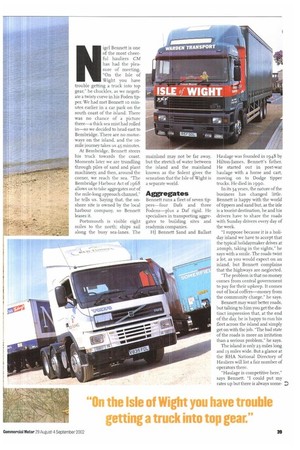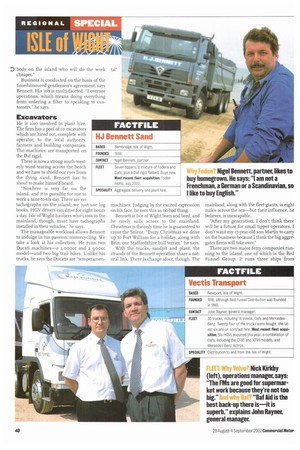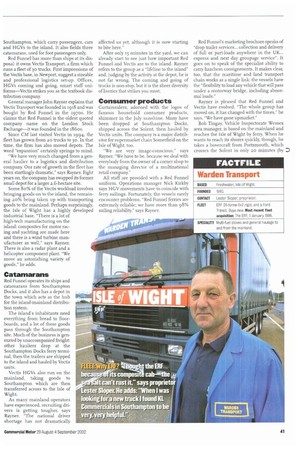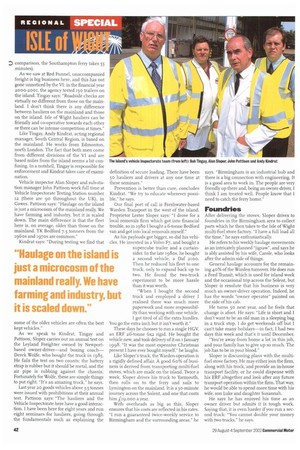N igel Bennett is one of the most cheerful hauliers CM
Page 39

Page 40

Page 41

Page 42

If you've noticed an error in this article please click here to report it so we can fix it.
has had the pleasure of meeting. "On the Isle of Wight you have trouble getting a truck into top gear," he chuckles, as we negotiate a twisty curve in his Foden tipper. We had met Bennett to minutes earlier in a car park on the south coast of the island. There was no chance of a picture there—a thick sea mist had rolled in—so we decided to head east to Bembridge. There are no motorways on the island, and the tomile journey takes us 45 minutes. At Bembridge, Bennett steers his truck towards the coast. Moments later we are trundling through piles of sand and plant machinery, and then, around the corner, we reach the sea. "The Bembridge Harbour Act of 1968 allows us to take aggregates out of the mile-long approach channel," he tells us. Saying that, the onshore site is owned by the local harbour company, so Bennett leases it.
Portsmouth is visible eight miles to the north; ships sail along the busy sea-lanes. The mainland may not be far away, but the stretch of water between the island and the mainland known as the Solent gives the sensation that the Isle of Wight is a separate world.
Aggregates
Bennett runs a fleet of seven tippers—four Dafs and three Fodens—plus a Dal rigid. He specialises in transporting aggregates to building sites and readymix companies.
HJ Bennett Sand and Ballast
Haulage was founded in 1948 by Hilton-James, Bennett's father. He started out in post-war haulage with a horse and cart, moving on to Dodge tipper trucks. He died in 1990.
In its 54 years, the nature of the business has changed little. Bennett is happy with the world of tippers and sand but, as the isle is a tourist destination, he and his drivers have to share the roads with Sunday drivers every day of the week.
"I suppose because it is a holiday island we have to accept that the typical holidaymaker drives at 2 omph, taking in the sights," he says with a smile. The roads twist a lot, as you would expect on an island, but Bennett complains that the highways are neglected.
"The problem is that no money comes from central government to pay for their upkeep. It comes out of local coffers—money from the community charge," he says.
Bennett may want better roads, but talking to him you get the distinct impression that, at the end of the day, he is happy to run his fleet across the island and simply get on with the job. "The bad state of the roads is more an irritation than a serious problem." he says.
The island is only 23 miles long and 13 miles wide. But a glance at the RHA National Directory of Hauliers will list a fair number of operators there.
"Haulage is competitive here," says Bennett. "I could put my rates up but there is always some body on the island who will do the work tar cheaper."
Business is conducted on the basis of the time-honoured gentlemen's agreement, says Bennett. His job is multi-faceted. "I oversee operations, which means doing everything from ordering a filter to speaking to customers," he says.
Excavators
He is also involved in plant hire. The firm has a pool of ro excavators which are hired out, complete with operator, to the local authority, farmers and building companies. The machines are transported on the Daf rigid, There is now a strong south-westerly wind tearing across the beach and we have to shield Our eyes from the flying sand. Bennett has to shout to make himself heard.
"Nowhere is very far on the island, and it is possible for me to work a nine-to-six day. There are no tachographs on the island; we just use log books. HGV drivers can drive for eight hours a day. Isle of Wight hauliers who cross to the mainland, though, must have tachographs installed in their vehicles," he says.
The manageable workload allows Bennett to indulge in his passion: motorcycling. We take a look at his collection. He runs two Ducati machines—a L000cc and a 900cc model—and two big trail bikes. Unlike his trucks, he says the Ducatis are "temperamen machines. Judging by the excited expression on his face, he sees this as no bad thing.
Bennett is Isle of Wight born and bred, and he rarely sails across to the mainland. Christmas is the only time he is guaranteed to cross the Solent. "Every Christmas we drive up to Fort William for a holiday, along with Brin, our Staffordshire bull terrier," he says.
With the trucks, sandpit and plant, the strands of the Bennett operation share a natural link. There is change afoot, though. The mainland, along with the fleet giants, is eight miles across the sea—but their influence, he believes, is inescapable.
"After my generation, [don't think there will be a future for small tipper operators. I don't want my 17-year-old son Martin to carry on the business because I think the big aggregates firms will take over."
There are two major ferry companies running to the island, one of which is the Red Funnel Group. It runs three ships from Southampton, which carry passengers, cars and HGVs to the island. It also fields three catamarans, used for foot passengers only.
Red Funnel has more than ships at its disposal: it owns Vectis Transport, a firm which runs a fleet of 3o trucks. First impressions of the Vectis base, in Newport, suggest a sizeable and professional logistics set-up. Offices, HGVs coming and going, smart staff uniforms—Vectis strikes you as the textbook distribution company.
General manager John Rayner explains that Vectis Transport was founded in 19'8 and was bought by Red Funnel in the 19705. He claims that Red Funnel is the oldest quoted company name on the London Stock Exchange—it was founded in the 186os.
Since CM last visited Vectis in 1994, the fleet has grown from 20 trucks to 3o. In that time, the firm has also moved depots. The word "expansion" certainly springs to mind. We have very much changed from a general haulier to a logistics and distribution company. Our rate of growth in the fleet has been startlingly dramatic," says Rayner. Eight years on, the company has swapped its former small depot for a larger 2.6-hectare site.
Some 8o% of the Vectis workload involves bringing goods on to the island, the remaining 20% being taken up with transporting goods to the mainland. Perhaps surprisingly, the Isle of Wight has a highly developed industrial base. "There is a lot of high-tech manufacturing on the island: composites for motor racing and yachting are made here and there is a wind turbine manufacturer as well," says Rayner. There is also a radar plant and a helicopter component plant. We move an astonishing variety of goods," he adds.
Catamarans
Red Funnel operates its ships and catamarans from Southampton Docks, and it also has a depot in the town which acts as the hub for the island-mainland distribution system.
The island's inhabitants need everything from bread to floorboards, and a lot of these goods pass through the Southampton site. Much of the business is generated by unaccompanied freight: other hauliers drop at the Southampton Docks ferry terminal, then the trailers are shipped to the island and hauled by Vectis units.
Vectis HGVs also run on the mainland, taking goods to Southampton which are then transferred across to the Isle of Wight.
As many mainland operators have experienced, recruiting drivers is getting tougher, says Rayner. "The national driver shortage has not dramatically affected us yet, although it is now starting to bite here,' After only 15 minutes in the yard, we can already start to see just how important Red Funnel and Vectis are to the island. Rayner refers to the group as a "lifeline to the island" and, judging by the activity at the depot, he is not far wrong. The coming and going of trucks is non-stop, but it is the sheer diversity of liveries that strikes you most.
Consumer products
Curtainsiciers, adorned with the logos of famous household consumer products, shimmer in the July sunshine. Many have been dropped at Southampton Docks, shipped across the Solent, then hauled by Vectis units. The company is a major distributor for supermarket chain Somerfield on the Isle of Wight, too.
"We are very image-conscious," says Rayner. "We have to be, because we deal with everybody from the owner of a corner shop to the managing director of a multinational retail company."
All staff are provided with a Red Funnel uniform. Operations manager Nick Kirkby says HGV movements have to coincide with ferry sailings. Fortunately, the vessels rarely encounter problems. "Red Funnel ferries are extremely reliable; we have more than 98% sailing reliability." says Rayner. Red Funnel's marketing brochure speaks of "drop trailer services.., collection and delivery of full or part-loads anywhere in the UK... express and next day grou page service". It goes on to speak of the specialist ability to carry hazchem consignments. It makes clear, too, that the maritime and land transport chain works as a single link: the vessels have the "flexibility to load any vehicle that will pass under a motorway bridge, including abnormal loads."
Rayner is pleased that Red Funnel and Vectis have evolved. "The whole group has moved on, it has changed with the times," he says. "We have gone upmarket.'
Bob Tingay, Vehicle Inspectorate Wessex area manager, is based on the mainland and reaches the Isle of Wight by ferry. When he wants to reach its shores quickly, though, he takes a hovercraft from Portsmouth, which crosses the Solent in only 20 minutes (by D comparison, the Southampton ferry takes 55 minutes).
As we saw at Red Funnel, unaccompanied freight is big business here, and this has not gone unnoticed by the VI: in the financial year 2000-2001, the agency tested 150 trailers on the island. Tingay says: "Roadside checks are virtually no different from those on the mainland. I don't think there is any difference between hauliers on the mainland and those on the island. Isle of Wight hauliers can be friendly and co-operative towards each other or there can be intense competition at times."
Like Tingay, Andy Kindrat, acting regional manager, South Central Region, is based on the mainland. He works from Edmonton, north London. The fact that both men come from different divisions of the VI and are based miles from the island seems a bit confusing. In a nutshell, Tingay is responsible for enforcement and Kindrat takes care of examination.
Vehicle inspector Alan Sloper and sub-station manager John Pattison work full time at Vehicle Inspectorate Testing Station number 12 (there are 90 throughout the UK), in Cowes. Pattison says: "Haulage on the island is just a microcosm of the mainland really. We have farming and industry, but it is scaled down. The main difference is that the fleet here is, on average, older than those on the mainland. TK Bedford 7.5 tonners from the 1960s and 1970s are common."
Kindrat says: "During testing we find that some of the older vehicles are often the best kept vehicles."
As we speak to Kindrat, Tingay and Pattison, Sloper carries out an annual test on the Leyland Freighter owned by Newportbased owner-driver—and boxing coach— Derek Wolfe, who bought the truck in 1985. He fails the test on two counts: the battery strap is rubber but it should be metal, and the air pipe is rubbing against the chassis. Fortunately for Wolfe, these are simple things to put right. "It's an amazing truck," he says.
Last year 2o goods vehicles above 3.5 tonnes were issued with prohibitions at their annual test. Pattison says: "The hauliers and the Vehicle Inspectorate here have a good interaction. 1 have been here for eight years and run eight seminars for hauliers, going through the fundamentals such as explaining the
definition of secure loading. There have been 50 hauliers and drivers at any one time at these seminars."
Prevention is better than cure, concludes Kindrat. "We try to educate wherever possible," he says.
Our final port of call is Freshwater-based Warden Transport in the west of the island. Proprietor Lester Sloper says: "I drove for a local removals firm which got into financial trouble, so in 1980 I bought a 6-tonne Bedford van and got into local removals myself:" As his payloads got bigger, so did his vehicles. He invested in a Volvo F7, and bought a supercube trailer and a curtainsider. In the late I98os, he bought a second vehicle, a Daf 2100. Then he reduced his fleet to one truck, only to expand back up to two. He found the two-truck experiment to be more hassle than it was worth.
"When 1 bought the second truck and employed a driver I realised there was much more paperwork and more responsibility than working with one vehicle. got tired of all the extra hurdles. You go the extra inch but it isn't worth it."
These days he chooses to run a single HGV, an ERF 26-tonne 6xz rigid. He bought the vehicle new, and took delivery of it on I January 1998. "It was the most expensive Christmas present I have ever bought myself," he laughs.
Like Sloper's truck, the Warden operation is a rigidly defined affair. A good 6o% of business is derived from transporting multi-fuel stoves, which are made on the island. Twice a week, Sloper drives his truck to Yarmouth, then rolls on to the ferry and sails to Lymington on the mainland. It is a 30-minute journey across the Solent, and one that costs him Z19,000 a year.
With overheads as big as this, Sloper ensures that his costs are reflected in his rates. "I run a guaranteed twice-weekly service to Birmingham and the surrounding areas," he says. "Birmingham is an industrial hub and there is a big connection with engineering. It is a good area to work in. The people are very friendly up there and, being an owner-driver, I think I am treated well. People know that I need to catch the ferry home."
Foundries
After delivering the stoves, Sloper drives to foundries in the Birmingham area to collect parts which he then takes to the Isle of Wight multi-fuel store factory. "I have a full load all the time," he says enthusiastically.
He refers to his weekly haulage movements as an intricately planned "jigsaw", and says he is ably assisted by his wife, Carole, who looks after the adrnin side of things.
General haulage accounts for the remaining 40% of the Warden turnover. He does run a Ford Transit, which is used for island work and the occasional trip across the Solent, but Sloper is resolute that his business is very much an owner-driver operation. Indeed, he has the words "owner operator" painted on the side of his cab.
He turns 50 next year, and he feels that change is afoot. He says: "Life is short and 1 don't want to be an old man in a sleeping bag in a truck stop. I do get weekends off but I can't take many holidays—in fact, I had two days this week and that's it until December.
"You're away from home a lot in this job, and your family has to give up so much. The job has to be in your blood."
Sloper is discussing plans with the multifuel stove factory. He may either join the firm, along with his truck, and provide an in-house transport facility, or he could dispense with his ERF altogether and look after any future transport operation within the firm. That way, he would be able to spend more time with his wife, son Luke and daughter Susannah.
He says he has enjoyed his time as an owner driver but admits it is tough work. Saying that, it is even harder if you run a second truck: "You cannot double your money with two trucks," he says.
















































































































































